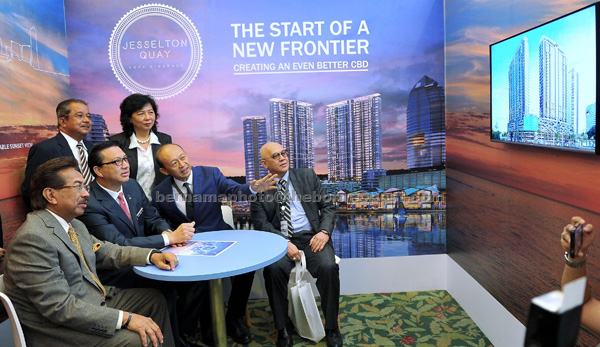
Musa Aman (seated left) and Liow (seated, second left) receive a briefing on Sabah Port’s operations yesterday. Also present are Sabah Post chairman Datuk Karim Bujang (standing, left) and Suria Group chief executive officer Ng Kiat Min (standing, right). — Bernama photo
KOTA KINABALU: The Transport Ministry (MOT) has agreed to open up the cabotage policy in Sabah as a step towards helping the state’s economic growth.
The minister, Datuk Seri Liow Tiong Lai said the federal government would continue to be attentive to Sabah’s concerns, to provide the best economic environment for it.
“There has been a long-standing debate on the root causes behind the higher cost of many consumer goods in Sabah and Sarawak compared to the Peninsular and this has been largely attributed to Malaysia’s cabotage policy protections.
“I am pleased to announce that the government is currently reviewing the cabotage policy for further liberalisation mechanisms to ensure affordable cost of goods and services in the state,” he added.
Liow said this in his speech at the Sabah Port Forum yesterday.
The event was declared open by Chief Minister Datuk Seri Musa Aman.
Liow also noted that the main cause of the high prices of goods in Sabah was not due to the cabotage policy and shipping costs, but weak distribution channels, high handling charges and inefficient inland transportation.
In terms of transport connections, he acknowledged that Sabah should tap its strategic position within the Brunei, Indonesia, Malaysia and the Philippines East Asean Growth Area (BIMP-EAGA).
“Sea routes as those from South America and Australia to China, particularly favours Sabah’s geostrategic location.
“Sabah needs to unlock its potential to emerge as a substantial player in the maritime and logistics sector,” he said.
Realising the importance of Sabah as a maritime hub, Liow said the federal government had approved an allocation of RM1.027 billion for the expansion of the Sapangar Bay Container Port (SBCP) in the first rolling plan of the 11th Malaysia Plan.
“This (expansion) marks a significant recognition of Sabah’s port infrastructure development and its role in bringing about balanced economic improvements in the state through enhanced port connectivity and network,” he added. — Bernama
